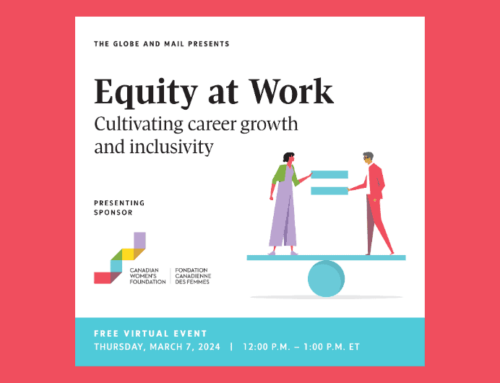Anti-Black racism has a long history in Canada, and the experience is intersectional. Black women, girls, trans, and non-binary people experience discrimination based on their race and their gender, as well as other identity factors such as their sexuality, ability, faith, age, and more.
These resources on ending anti-Black racism and misogynoir in Canada are particularly helpful for non-Black people to educate themselves and share with others.
We’ll add to this list as new resources become available, and we encourage you to link to any you’ve found helpful in the comments.
Listen
Misogynoir and Healing Journeys With Monica Samuel
Misogynoir is a term coined by Dr. Moya Bailey to describe the distinctive form of anti-Black sexism faced by Black women. Though Black women are highly educated, they face disproportionate barriers to entrepreneurial financing and support. They’re racially profiled and over-incarcerated, and over-represented when it comes to chronic illnesses.
Gender Pay Gaps, Plural with Hadiya Roderique
In Canada, women make 88 cents for every dollar men make. But there’s more than one gender pay gap because those who face gender inequalities are a diverse population. Racialized women make 67 cents to the dollar for racialized men, Indigenous women make 65 cents to the dollar for Indigenous men, newcomer women make 71 cents to the dollar for newcomer men, and women with disabilities also have lower average incomes compared to men with disabilities.
Family Violence, Racialized Survivors With Simone Saunders
Family violence refers to many kinds of abuse and neglect in families. Umbrella terms like this can be challenging. Umbrella terms can also make it hard to envision how different people experience things differently depending on who they are.
Eternity: Listen without judgement
Eternity’s 2020 memoir, They Said This Would Be Fun spotlights her experiences being a student of colour on a predominantly white campus, while also being with an abusive boyfriend. This episode focuses on Eternity’s first-person account of navigating university life while navigating her abusive relationship.
Read
Pitch Better’s FoundHers Report finds that Black Women Entrepreneurs are highly educated and severely underfunded
In a first of its kind study, the FoundHers report on Black women entrepreneurs surveyed more than 1,500 founders across Canada to identify any structural problems and explore insights and recommendations for better investment in this community as vital members of the Canadian business ecosystem. Supported by the Canadian Women’s Foundation, BDC, and Brock University, FoundHers is the inaugural report in a series.
Author Robyn Maynard on Anti-Black Racism, Misogyny, and Policing in Canada
“One of the reasons that racism persists in Canada is because our commitment to the perception of racial tolerance & harmony seems to be prized above the actual lived experiences of people.”
Read more from this Q&A with Robyn Maynard, author of Policing Black Lives.
5 Black Women Talk About Their Lives In Canada–Past, Present And Future
“In Canada, Black women are still discriminated against in the healthcare system … We continue to be victims of police and state violence, and in the workplace, continue to be paid less than both white men and white women.”
Read more from reporter Eternity Martis on the experience of being a Black woman in Canada.
Watch
Black Women + Beauty Standards: A Conversation on Subjects of Desire
What are the interconnections between Black women and beauty standards, anti-black racism and misogynoir, and gender-based violence and the pursuit of safety, rights, freedom, love, and gender justice? Join this dynamic panel on themes and topics of the award-winning documentary, Subjects of Desire, which speaks to Black women and beauty standards and “deconstructs a harmful past to push new narratives toward a powerful and gorgeous future.”
Black Women Author Voices in the Journey to Gender Equality
Marking Black History Month 2021, this discussion featured four incredible Black women authors: Zalika Reid-Benta, author of Frying Plantain, Eternity Martis, author of They Said This Would be Fun: Race, Campus Life, and Growing Up, Jael Richardson, author of Gutter Child, and Francesca Ekwuyasi, author of Butter Honey Pig Bread.
Roots and Resistance
This 2018 webinar from Yamikani Msosa explores the connections between sexual violence, state violence, and healing from collective and individual sexual abuse and trauma for Black survivors.
Deepen your Anti-Racism Work
This 2020 list of anti-racism resources is a robust source for everything from children’s books to podcasts recommendations. They are all still so relevant today.
Check it out, and commit to reading, watching or listening to at least three of these texts.
Learn more:
- Three Essential Insights for Black History Month with Paulette Senior
- Time to Challenge Misogynoir in Fundraising and Nonprofits
- The Intertwined Journey Towards Gender and Racial Justice
- Why COVID-19 Is Even More Dangerous For Black Women
- Black Women’s Identity in Canada: Parting the Roots of Black Hair with Simone Wright
- When Discrimination is About More Than Gender: The Village Bloggurls Tackle Race and Gender-Based Violence
- What African (Black) History Month Means to Me






